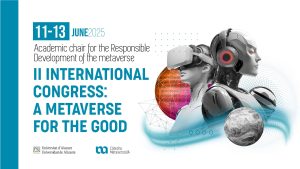
The MetaverseUA Chair Newsletter #12 - July 2024
Welcome to a new issue of the MetaverseUA Chair newsletter. June was a busy month for the Chair, with our fantastic International Congress. If you missed it, you can check a summary in our previous issue of this newsletter, with pictures and recordings. Many more interesting resources are coming, including some papers presented in Alicante during those exciting sunny days. But enough talking about the past. Let´s check what is ahead for Virtual Worlds. Buckle up! Let’s go to it.
e-Sports on the treadmill these days, with their World Cup
The e-sports World Cup is taking place during these days in Riyadh, Saudi Arabia. From July 3 to August 25, the best players in the world will gather around the Arabian capital to do their craft and compete for a total of $60 million in prizes.
e-Sports are one of the most successful manifestations of the Metaverse nowadays. Elements such as the persistence and interoperability are yet to be developed in order to reach scalability of many e-Sports platforms as virtual worlds. Nevertheless, these are some of the most interesting business developments for the Metaverse, and will certainly expand and grow in the future. Numbers speak loudly: this industry is estimated to be worth more than $200 billion, and has some 3 billion players worldwide.
Besides, there are many interesting legal implications in the development of the s-sports as a business, related to the Metaverse. Some of these were pointed out by James Nurton in the EUIPO Newsletter last issue: copyright and illegal content already heavily affects e-sports (see the European Commission Recommendation on the matter). Trademarks have also a heavy presence in e-sports, as they do in other virtual worlds. There is already case-law on the matter that will certainly grow in importance and impact, considering the likelihood of confusion in avatars skins as trademarks, or the display and breach of trademarks in e-sports platforms.
Spanish administration to control adult content access online
The Spanish administration recently presented their project to regulate access to adult content on the Internet. Their intention is to increase the protection of children when navigating the web. By barring them from access to violent content and pornography, for instance, they aim at decreasing problems associated with the every-day earlier access to this online content. The project consists of a virtual credential issued by the public administration that is saved in the public e-wallet of every citizen. The content providers will need to check the age of the user by offering a QR code that is scanned by the virtual app integrated in the e-wallet. Thus, keeping the system – allegedly – private. The initiative has extensively been trolled in social media. It is nonetheless a pioneer project, in an expedited way in Western democracies.
If this proposal succeeds, it would be the most far-reaching initiative in the EU related to the online protection of minors since the inception of eIDAS II. It would also raise many important concerns for privacy. A system like this one would generalise ID controls all around the Internet, and would also affect the Metaverse. Some companies may be interested in creating a virtual world with this type of content. Or, incidentally, some of this content could be included in a platform. The latter could also be happening in social media. What would their obligations be, in that case?
A lot of criticism has already been raised from the privacy and cybersecurity angles. The initiative has been registered as a legal proposal before the Spanish legislators. It will need to forego political debate, and its approval is uncertain, considering the current positioning in the matter of the political groups. For the moment, it would only oblige the content providers based in Spain. Which limits very much the scope of the law, even if it is successfully passed.
Google is training a fast horse for the A-R race
Google is back in the race for the Metaverse. The big tech seems to be in search of an angle for their business model related to the virtual worlds (pun intended). They recently used x-reality advancements in the presentation of their Project Astra during their developers conference I/O 2024 in May. This project develops a virtual assistant who can see and perceive the world around it. They used it publicly on VR glasses to show the capabilities of the assistant. Business Insider has the full story on this very important industry development.
This move could have deep implications for competition in the big tech environment around the Metaverse. For one thing, Meta, inc. was openly the first big corporation to develop significant investments in the domain. Competition is known to be positive for consumers in the market, and the Metaverse is not an exception. Google has deep pockets, but may be too late in the race. They attempted previously other moves in this industry, such as the introduction of their Daydream VR glasses. However, other companies seem to be ahead, such as Apple with their Vision Pro, and the famous and promising partnership between Meta and Ray-Ban.
One element that may allow them to catch up is the operative system. Alphabet, inc is aiming at developing a software for developers of augmented reality, namely Android XR. This system could be a germin of a dominant interoperable OS for the Metaverse. So far, Apple, Meta and other companies have opted to develop their own systems, such as Horizon OS for Meta, in association with Lenovo and Microsoft. A partnership was reportedly offered by Google to Meta for their participation in Android XR, but it was refused in the past. So, it’s the racecourse scenario for them only left now.









